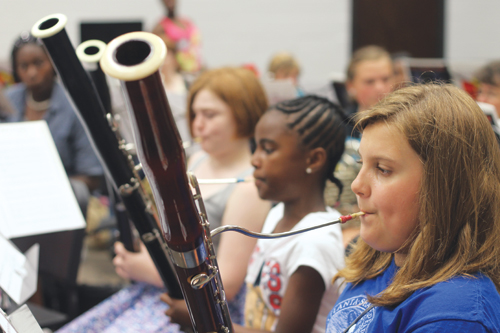
When it comes to school bands and orchestras, the level of director anxiety is usually inversely proportional to the number of rehearsals remaining prior to a major concert or contest. If this anxiety manifests itself in rehearsal, students tend to pick up on it, and this can negatively affect how they perform. When the director takes measures to alleviate this anxiety, students will also relax and perform better on stage. Here are some suggestions for the last four to six rehearsals before a performance:
The closer to the performance, the more you play.
While picky rehearsals with lots of stops are beneficial when first learning a piece, or even when working on details later, rehearsals that take place within the week of the performance should focus on building confidence through repetition and playing big chunks of music. This creates a greater sense of continuity.
After playing through large portions of the music, go back and address problems that cropped up. Only a few should be dealt with at a time before playing through the music again. In other words, don’t play through a long passage and then proceed to read a laundry list of problems. Prioritize, address, play through, and then repeat this process as needed.
If preparing a typical contest or concert program of three or more selections, try to touch on something from each piece each day. From day to day, vary the order in which selections are rehearsed so the band does not always start with the same piece. Leading into the performance, the idea is to cover as much of the music as possible while still addressing and problems.
In the history of school music there have been few perfect performances. Playing large portions of the music without stopping helps students learn to continue playing even when they make mistakes.
Change the Focus
Early rehearsals are about the big picture; students learn to play the right notes, observe correct rhythms, and build in dynamics and balance. As the performance date draws near, students can become complacent. This usually manifests itself in careless mistakes, often in passages that have been fine for weeks. Suddenly there are wrong notes, random bad sounds, and early entrances.
Students become comfortable with their parts and sometimes mentally fatigued from focusing on the same elements of the music over a long period of time. Make the music fresh again through a change in focus. A week or two before the concert, work primarily on artistic elements, assuming, of course, that the technical problems are well in hand. These can include phrasing, nuance, implied dynamic changes, and shaping.
Don’t Overreact
As students achieve greater mastery of their parts and the music becomes more transparent, it becomes easier to hear individual mistakes, even small ones. Some directors feel like they are playing the arcade game Whack-A-Mole when trying to deal with one mistake and three others pop up.
While it is important to address problems, overreacting raises the level of tension in the room, which leads to more mistakes. One suggestion is to approach the rehearsal as if you are a clinician for someone else’s group. By removing, or at least suppressing, the emotional investment, directors are better able to help the group improve.
Humor
Humor can be a wonderful release valve when tensions run high. When I sense that my band is letting stress affect their performance, I tell a joke or a funny story. An icebreaker acts as a reset button and allows students to clear their minds and bring their focus back to playing music instead of worrying about mistakes.
Breathing
Finally, when students are tense, it can be visible in the necks, shoulders, and even faces of ensemble members as they play. As they progress through a selection, wind players tend to take shallower and quicker breaths, leading to even more tension.
Tell students to start all notes with a full, relaxed breath and encourage them to play complete phrases and then fully replenish their air. In extreme cases, directors should stop the ensemble and do a simple breathing exercise such as inhaling for 2 counts and then blowing a focused airstream to the palm of the hand for 4-8 counts. A sigh also tends to relax the body and serves as a quick reminder for proper breathing technique (deep breath in and turn the air around immediately).
If brass players start to crack entrances as a performance draws near, have them practice starting notes at entrances with air only, no articulation. This forces them to think more about centering the notes. Once they can start the note with air only and with a centered sound free of cracks, have them put back in the articulation.
By reducing tension and anxiety in the rehearsals that lead up to performances, directors allow students to focus on making music rather than just trying to avoid mistakes.






